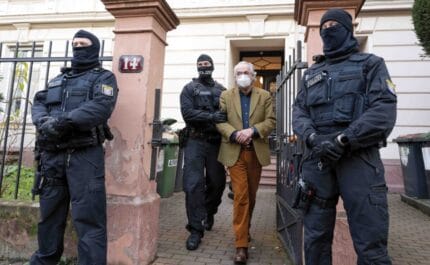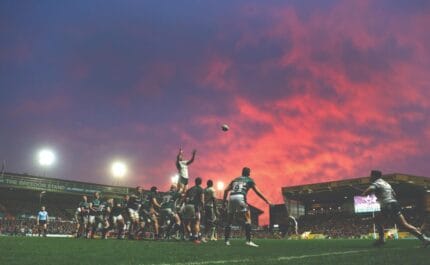Summer of Sam – Allardyce’s England downfall reveals a practice that’s poisoning football
For ten weeks Sam Allardyce lived his ‘dream’ after becoming manager of the English national team. It was not to last: one game and one sting operation later he had left the post. James Montague examines a swift and unlikely fall from grace
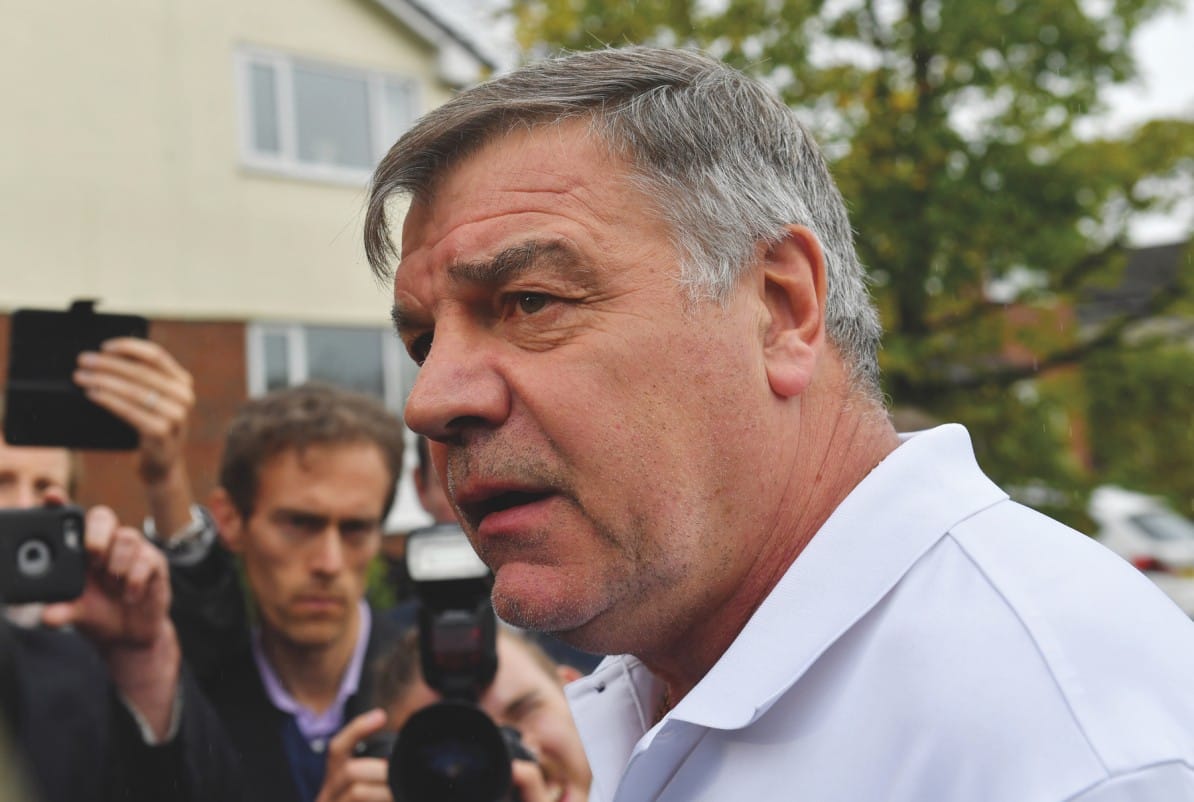
Big Sam faces the media outside his Bolton home, the day after he left the England job. Photo: Jane Mingay / AP / Press Association Images
27th September (Taken from: #24)
On 27th September members of the England football team received a postcard from their new boss. “The journey has begun,” it said. But it was already over. As the postman was delivering his cheery message, the sender, Sam Allardyce, was addressing the media. “I can’t put into words how sad I am to lose the England job,” he said. “I know I’ve made a huge misjudgment.”
How do you lose a three-million-pound-a-year job in under 70 days? For Sam Allardyce all it took was a chat over a pint.
Having made a name for himself as the Houdini of relegation at club level, always escaping against the odds, ‘Big Sam’ had landed the most lucrative coaching job in international football: manager of the English national team. Following the departure of Roy Hodgson after a disastrous Euros tournament in the summer, the English Football Association (FA) had handed Allardyce, the experienced, outspoken veteran who had managed Bolton, Newcastle, West Ham and Sunderland, control of the national team on a two-year contract. It was, he said, his dream job. On Sunday 4th September the dream peaked as Allardyce’s England team won the opening game of their 2018 World Cup qualification campaign against Slovakia 1-0. Just over three weeks later he was unemployed.
The pint that cost Allardyce so much was with an undercover journalist from The Daily Telegraph who was posing as a businessman from Asia. He had met with Allardyce in August – before his first training session with the squad – to offer him a lucrative deal that would see the England manager advising his clients about how to invest in football. The conversation, which unbeknown to Allardyce was being filmed, turned to third-party ownership (TPO) and his employer’s ban on the practice. “It is not a problem,” said Allardyce. “You can still get around it, I mean obviously the big money’s here.”
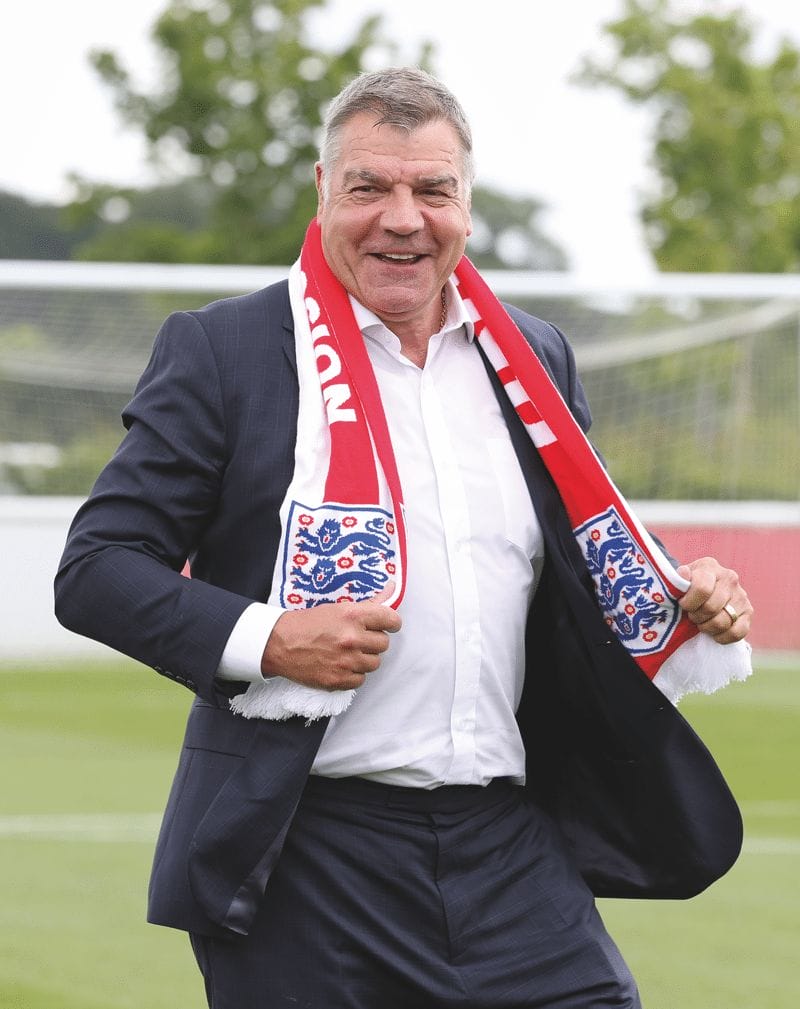
Posing with an England scarf on 25th July 2016, the day he was unveiled as England manager. Photo: Martin Rickett / PA Wire / PA Images
The publication of embarrassing clips from the video posed a problem for Allardyce and the FA. The low-quality footage of the England coach discussing consultancy work when he was already fabulously well paid by them looked unseemly – greedy, even. In the aftermath of his resignation, Allardyce would declare that “entrapment has won”, and he later called for the incriminating footage to be released in its entirety, to back up his claim that he was coaxed into saying things that he normally would not.
However the conversation came about, he had been filmed talking about a practice that has been mired in controversy, has been compared to “slavery” and is banned by both world football’s governing body, Fifa, and, in 2008, the FA itself.
The bountiful game
Third-party ownership is the ethically dubious outcome of a sport that is awash with cash. As bumper television contracts led to an explosion in wages in European football over the past two decades, investors started trying to figure out ways they could get in on the action. Owning a club was a high-risk affair, but owning a player… TPO, essentially, allows just that. A third party – ie someone who doesn’t represent the player or the club they play for – buys a percentage of a footballer’s future economic value. The investor then receives a percentage of the transfer fee when the player is sold on. When you consider that the value of footballers can increase by 600 percent over the course of a season, the opportunity is clear.
Third-party ownership gained its first foothold in South America, where it allowed cash-strapped clubs to sign players who would ordinarily be out of their reach before eventually selling them on to European clubs. Both the club and the investor would take a share of the resulting profits. For the first time, smaller clubs could afford to gamble on rising stars.
Was it right that a player could now be owned and traded by financial speculators, as if he was just another asset?”
But soon the problems with the system became clear. One was ethical. Was it right that a player could be owned and traded in this way, as if he was just another asset? Gordon Taylor, the chief executive of the Professional Football Association told The Observer that TPO is “like trading in human beings”, while Michel Platini, the former French international and president of Uefa called it a form of “slavery”.
Taylor also highlighted another major issue. Outside parties, whether they are individuals or investment funds looking for a decent return, suddenly had the whip hand when it came to transfers. Could they now decide when and for how much a player would be sold, rather than the club? The potential for outside influence on a club, and therefore the integrity of a competition, was clear.
Most British football supporters hadn’t heard of TPO until August 2006 when West Ham United pulled off an unlikely transfer coup. Then-coach Alan Pardew unveiled the signing of two Argentine internationals: Carlos Tevez and Javier Mascherano. Both players were considered among the brightest prospects in world football, destined for top European clubs. Yet, here they were, being paraded around the ground of a team often fighting relegation. How had West Ham managed to find the money? More importantly, how had they convinced two of world football’s brightest prospects to join a relegation dogfight rather than enjoy life in the Champions League?
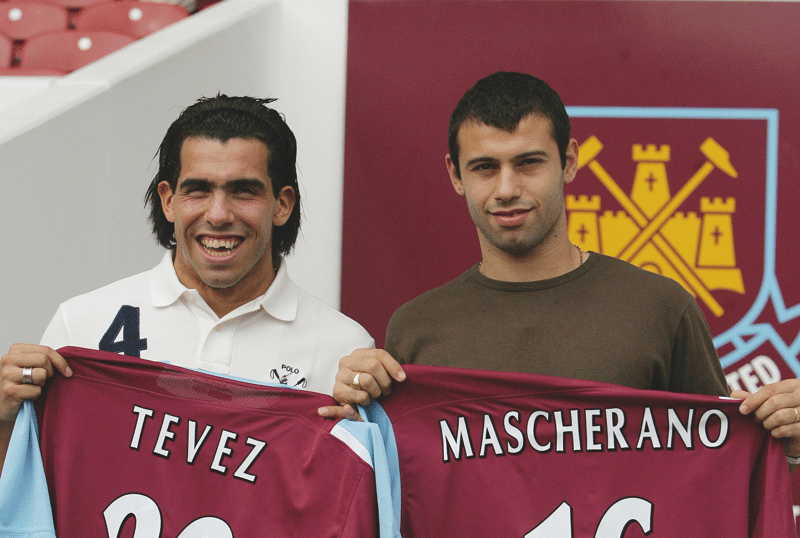
Photo: Dave Howarth / PA Wire / PA Images
The answer was that they didn’t need to find the money – at least not all of it. Although both players had been signed from Brazilian club Corinthians, the players’ rights were part-owned by Media Sports Investment (MSI), a company started by Kiavash Joorabchian, an Iranian-born British businessman and fund manager.
The West Ham deal looked like it would benefit everyone. It cost only £5 million for West Ham to bring Tevez and Mascherano to England from South America. West Ham would get two world-class players for comparative peanuts. Joorabchian hoped the players would prove themselves on the Premier League stage before being sold on to a larger club for much more. Things didn’t initially go to plan. Pardew was sacked and West Ham were teetering on the brink of relegation. Despite the team’s dire form Mascherano rarely played. On the last day of the season the club looked destined for the drop. It was Tevez who kept them up, scoring the only goal as West Ham beat Manchester United at Old Trafford. The win meant their nearest rivals, Sheffield United, went down instead. But it also meant West Ham were bound for the courts.
Sheffield United launched legal action against West Ham who they believed had gained an unfair advantage over them by bringing Tevez to West Ham via TPO. They settled out of court for £18.1 million.
Fifa deemed the transfer breached the rules on third-party ownership, and West Ham were fined a world-record £5.5 million”
Despite West Ham’s protests, Tevez moved to Manchester United in a deal reported to be worth £20 million. After threats of legal action by West Ham, MSI agreed to pay them £2 million to release the player. Mascherano left soon afterwards to move to Liverpool. Fifa deemed that this transfer breached rule U18, which concerns the influence of third-party ownership. West Ham were fined a world-record £5.5 million. Both players’ values flourished: Tevez switched to Manchester City for a reported record £47 million and Mascherano ended up at Barcelona with whom he won the Champions League.
Going Dutch
It hasn’t just been West Ham who have been burned by TPO. In the Netherlands, it very nearly brought another leading club to its knees. FC Twente emerged as a power in Dutch football in the last decade, overcoming the likes of Ajax and PSV Eindhoven, thanks in part to money from local businessman Joop Munsterman, a self-made millionaire.
With former England manager Steve McClaren at the helm, Twente won the Dutch league (Eredivisie) for the first time in 2010 and with it a chance to play in the Champions League. In an effort to keep up the spending needed to compete, Twente found themselves close to bankruptcy. “We couldn’t keep up with the rising wages,” Youri Mulder, a former Dutch international who has worked as a coach at Twente, tells me. “Without better wages, we couldn’t keep up with the fans’ demands. We couldn’t compete.”
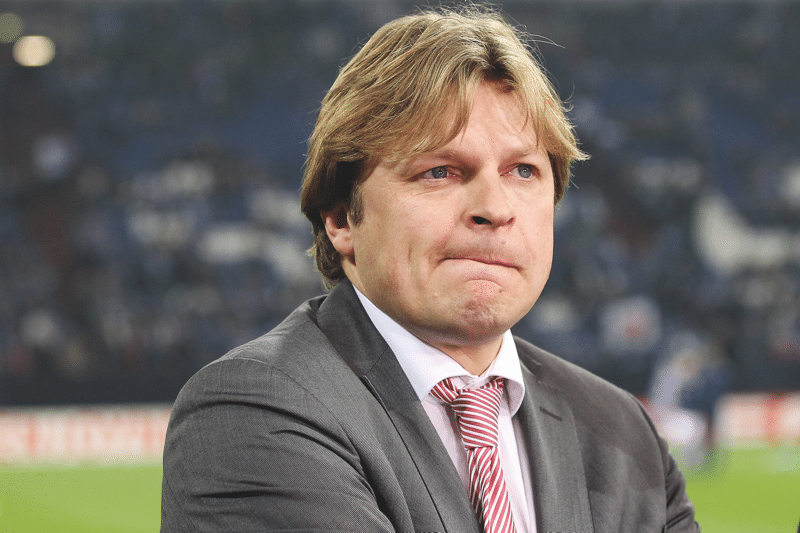
Youri Mulder witnessed the financial risks of big-money football first hand, as assistant coach at Twente. Photo: Revierfoto / DPA / PA Images
To try to maintain its position, the club borrowed €5 million against the future sale of seven of its players – including the Serbian international Dusan Tadic – from an organisation called Doyen Sports Group. “It was transparent,” says Mulder. “It was in the press that we had sold parts of players. The player was also informed. And they got money from that. It was a strange sensation, but it is a normal company business, like trading – you sell something. I can sell my house to someone else and still live in it.”
Yet the €5 million loan FC Twente received turned out to be a disastrous move. In 2015 a trove of documents was released by a hacktivist group called Football_Leaks. The documents appeared to show that, in return for the loan, the Doyen Group effectively controlled FC Twente’s transfer policy. If a bid came in for a player at a certain level, the club would have to either sell or pay Doyen a huge sum.
The deal, according to the Asser International Sports Law Blog, “points a loaded financial gun at FC Twente’s head each time a transfer offer of a certain amount is made”. This was clearly against the rules of both Fifa and the Dutch football association, the KNVB. Twente nearly went under: they were fined, banned from European competition for three years and relegated. They were later reinstated to the Eredivisie on appeal. Joop Munsterman, the chairman who had sank so much of his fortune into the club, resigned.
Southgate punched the air as the final whistle blew. England, it seemed, had already moved on”
Fifa followed the FA in announcing a ban on TPO in 2014 which came into effect in 2015. Both have since fined several clubs for involvement in the practice, but when you have the FA’s highest-profile employee saying that there are ways around the rules then it is clear that TPO hasn’t been eradicated. Money will always find a way.
In November Allardyce was cleared by the police investigating corruption in the game of having done anything illegal in the Telegraph’s sting, paving a way for his return to football. There was no shortage of job offers, and two days before Christmas Big Sam signed a two-and-a-half year contract to manage Crystal Palace, who had sacked Alan Pardew (that man again) after a run of defeats had left them at risk of relegation from the Premier League.
But where did that leave an embattled England side? On 11th November 2016 Allardyce’s heir apparent, Gareth Southgate, manager of the under-21 national team since 2013, watched from the touchlines as England enjoyed an impressive 3-0 victory over Scotland, moving them to the top of their World Cup qualification group. Southgate couldn’t contain his delight, punching the air as the final whistle blew. England, it seemed, had already moved on; Southgate was officially appointed to the top job on 30th November. Allardyce, at the time, had two things to console him. He received a payoff for his 67 days work, believed to be in the region of £1 million – and his 100 percent win as manager record seems unlikely ever to be bettered.
James Montague is the author of The Billionaires Club: The Unstoppable Rise of Football’s Super-Rich Owners, published by Bloomsbury in 2017.
Slow Journalism in your inbox, plus infographics, offers and more: sign up for the free DG newsletter. Sign me up
Thanks for signing up.
